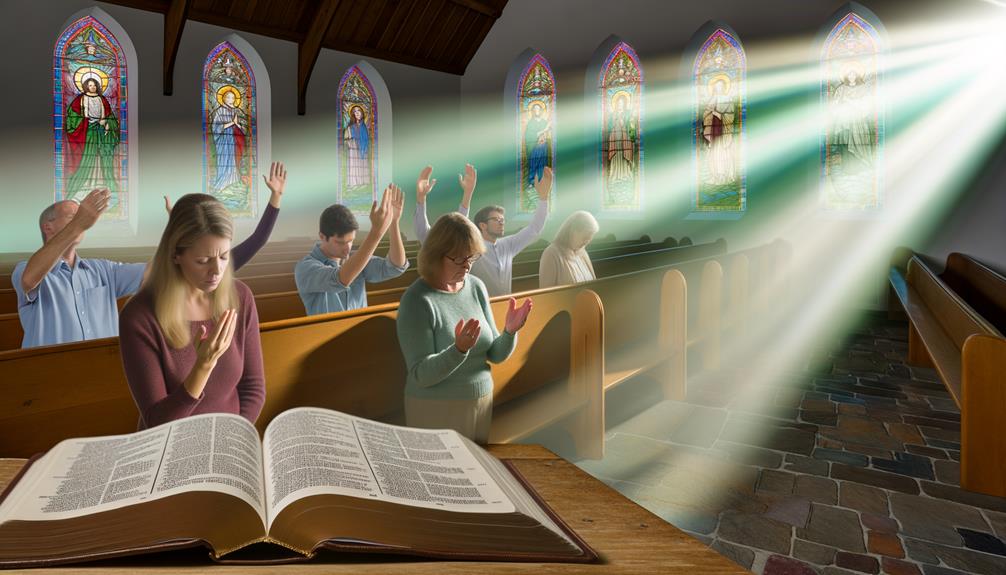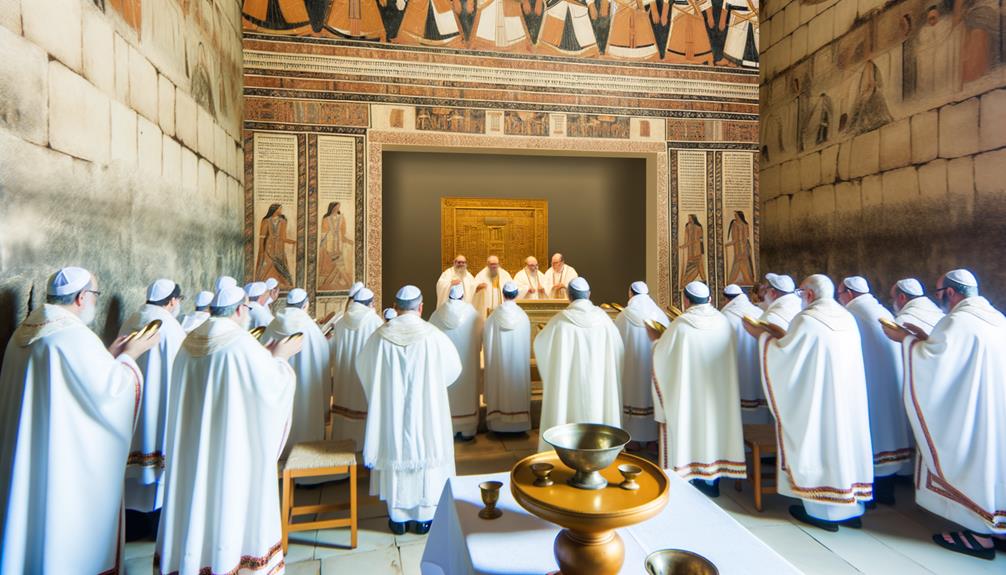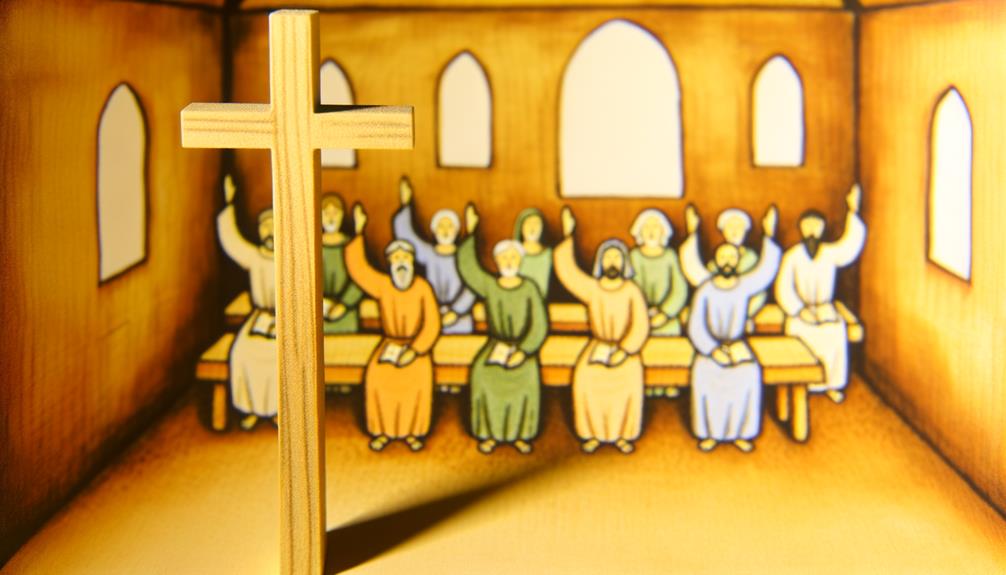Meaning of Worship According to the Bible: Reverence
Worship in the Bible signifies profound reverence and submission to God, rooted in Hebrew ‘shachah’ and Greek ‘proskuneo’. It involves both outward acts such as prayer, praise, and offerings, and inner spiritual realities of devotion and obedience.
The Old Covenant emphasizes ritual sacrifices and festivals, while the New Covenant shifts towards worship in ‘spirit and truth’ (John 4:24), highlighting a personal and relational connection with God through faith in Jesus Christ. Scriptural examples and teachings illustrate worship as a holistic and continual practice integral to a believer’s life.
Exploring further reveals deeper nuances of biblical worship.

Meaning of Worship According to the Bible: Reverence, Devotion, and Submission to God
| Aspect | Biblical Meaning |
|---|---|
| Reverence and Adoration | Worship in the Bible means showing reverence, adoration, and honor to God, acknowledging His holiness and supreme authority (Psalm 95:6). |
| Wholehearted Devotion | True worship involves giving God wholehearted devotion, including every aspect of life—thoughts, actions, and emotions (Romans 12:1). |
| Spirit and Truth | Worship must be done “in spirit and in truth” (John 4:24), meaning it is genuine and led by the Holy Spirit, not just outward rituals. |
| Submission to God’s Will | Worship reflects submission to God’s will and acknowledgment of His sovereignty, recognizing that He is the creator and sustainer of all things (Philippians 2:9-11). |
| Praise and Thanksgiving | Worship also involves praise and thanksgiving, offering gratitude for God’s blessings, grace, and love (Psalm 100:4). |
Biblical Definitions of Worship

The concept of worship within the Bible encompasses a multifaceted array of practices and attitudes, reflecting a profound reverence and adoration directed towards God.
Biblically, worship is derived from the Hebrew term ‘shachah’ and the Greek term ‘proskuneo,’ both implying acts of bowing or prostration, signifying submission and homage.
Worship extends beyond physical gestures to include elements such as prayer, praise, and obedience.
The New Covenant further refines this definition, emphasizing worship in ‘spirit and truth’ (John 4:24), indicating an inward, heartfelt devotion rather than mere external rites. This shift in emphasis from outward ritual to inner sincerity aligns with the overall theme of the New Testament, which emphasizes the importance of a personal relationship with God. The idea of worshiping in ‘spirit and truth’ also emphasizes the depth and authenticity of one’s devotion to God. This intention is further demonstrated in the meaning of amen in bible verse, which signifies agreement and affirmation of the truth being spoken.
Therefore, biblical worship integrates both outward expressions and inner spiritual realities, forming a thorough framework that underscores the relational and covenantal dynamics between believers and the divine.
Worship in the Old Testament

Embedded within the Old Scriptures narrative, worship emerges as a central theme, intricately woven into the religious and communal life of Israel through prescribed rituals, sacrifices, and festivals. This worship was characterized by:
- Sacrificial Offerings: Central to Old Testament worship, these included burnt offerings, grain offerings, peace offerings, and sin offerings, serving as acts of atonement and devotion (Leviticus 1-7).
- Festivals and Holy Days: Key events like Passover, the Feast of Weeks, and the Feast of Tabernacles marked communal worship and remembrance of God’s covenant and deliverance (Exodus 23:14-17).
- Temple Worship: The temple in Jerusalem became the focal point for national worship, housing the Ark of the Covenant and facilitating priestly intercession (1 Kings 8).
- Law and Commandments: The Torah provided thorough guidelines for worship practices, underscoring obedience as an integral aspect of honoring God (Deuteronomy 6).
This framework illustrates the multifaceted nature of worship in the Old Testament.
Worship in the New Testament

Contrasting the elaborate rituals and temple-centric worship of the Old Covenant, New Covenant worship emphasizes a personal, spiritual relationship with God through faith in Jesus Christ.
This paradigm shift is encapsulated in John 4:24, where Jesus asserts, ‘God is spirit, and his worshipers must worship in the Spirit and in truth.’
The New Covenant posits that true worship transcends physical locations and rituals, centering instead on a transformed heart and mind (Romans 12:1-2).
Additionally, the role of the Holy Spirit is essential, guiding believers into a deeper, more intimate communion with God (Galatians 4:6).
This theological shift underscores the importance of inner sincerity and spiritual authenticity as foundational elements of New Covenant worship.
Examples of Worship in the Bible

Frequently, the Bible provides profound illustrations of worship that highlight the diverse ways individuals and communities have expressed reverence and devotion to God throughout biblical history. These examples not only illustrate the forms of worship but also the underlying theological principles that guide such practices.
- Abraham’s Sacrifice: In Genesis 22, Abraham’s willingness to sacrifice Isaac epitomizes obedience and faith as central components of worship.
- The Psalms: The Book of Psalms offers a rich tapestry of worship through songs, prayers, and lamentations, reflecting communal and individual devotion.
- Solomon’s Temple Dedication: In 1 Kings 8, Solomon’s elaborate dedication of the Temple signifies national worship and the sanctity of sacred spaces.
- Jesus in Gethsemane: In Matthew 26, Jesus’ prayer in Gethsemane underscores the importance of submission to God’s will in personal worship.
Worship in Daily Life

In the biblical narrative, worship in daily life encompasses a holistic approach where every action, thought, and decision is oriented towards honoring God. This extensive form of worship transcends ritualistic practices, embedding divine reverence within mundane activities. The apostle Paul exhorts believers in 1 Corinthians 10:31, ‘Whether you eat or drink, or whatever you do, do all to the glory of God.’ This perspective underscores the integration of worship into the very fabric of daily existence.
| Aspect of Life | Biblical Reference |
|---|---|
| Work | Colossians 3:23 |
| Relationships | Ephesians 5:21 |
| Speech | Ephesians 4:29 |
| Thoughts | Philippians 4:8 |
| Service | Romans 12:1 |
Thus, biblical worship in daily life is not confined to specific acts but is a perpetual, all-encompassing state of being.
Conclusion
To summarize, biblical worship encompasses a multifaceted understanding that spans both the Old and New Scriptures, integrating ritualistic practices and heartfelt devotion.
The story of the woman with the alabaster jar (Luke 7:36-50) exemplifies the profound nature of worship as an act of surrender and reverence, symbolizing the breaking open of one’s life in total devotion.
This narrative underscores worship’s essence: a holistic, daily expression of reverence, transcending mere ritual to embody a continuous, living sacrifice.






